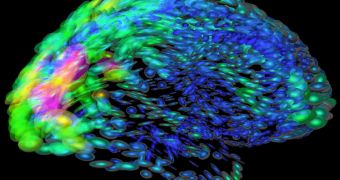The human brain is known to take deep pleasure from caresses. Researchers can notice it light up when one person in a couple is touched by the other. A team of Swedish investigators has now determined that the reaction also ensues when people view others being caressed.
Until now, experts had no idea that such a strong activation pattern could be seen in a person that watches two other people caressing each other. The work was carried out by a team based at the University of Gothenburg.
In the new experiments, volunteers were placed inside Magnetic Resonance Imaging (MRI) machines, and asked to watch videos of other people being touched with a soft brush, both slowly and fast. The results were then compared to how their brain reacted when they themselves were subjected to the same treatment.
Surprisingly, the investigators determined that test subjects displays remarkably similar activation patterns in areas of their brain that are in charge of producing pleasure and regulating emotions. Participants reacted most intensely to soft strokes, both on themselves and in the videos.
“The aim was to understand how the brain processes information from sensual contact, and it turned out that the brain was activated just as quickly when the volunteers got to watch someone else being caressed as when they were being caressed themselves,” India Morrison, PhD, explains.
The investigator was a member of the science team that conducted the new investigation, PsychCentral reports. Details of the study were published in the latest issue of the medical Journal of Neuroscience.
“Even when we are only watching sensual skin contact, we can experience its emotional meaning without actually feeling the touch directly,” she goes on to say. Interestingly, the same activation patterns were not observed when people saw others caressing inanimate objects.
The main implication of the new study is that the capacity to perceive other people's emotions is hardwired into the human brain. Thus far, experts were able to establish that each of us can experience the feelings of others, through mechanisms that involve the mirror neuron system.
The research indicates “that our brain is wired in such a way that we can feel and process other people’s sensations, which could open up new ways of studying how we create empathy,” Morrison argues.
“It’s important for us as people to understand the significance of different types of touch – to know whether two people are in a relationship or are about to start a fight,” she concludes.

 14 DAY TRIAL //
14 DAY TRIAL //